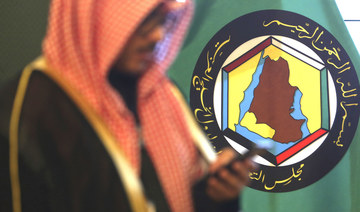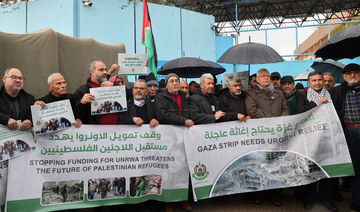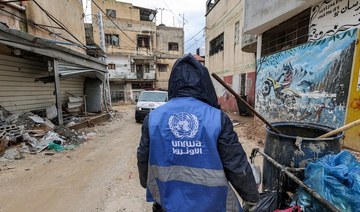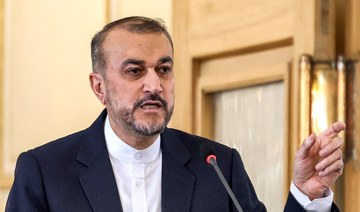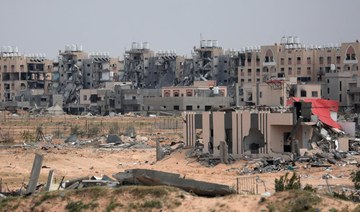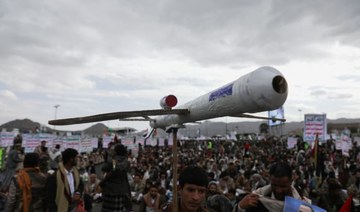TEHRAN: Iran said a longstanding UN embargo on arms sales to and from the Islamic republic expired Sunday in line with a 2015 landmark nuclear deal with world powers from which Washington has withdrawn.
Tehran, which could now purchase weapons from Russia, China and elsewhere, has hailed the development as a diplomatic victory over its arch enemy the United States, which had tried to maintain an indefinite freeze on arms sales.
“As of today, all restrictions on the transfer of arms, related activities and financial services to and from the Islamic Republic of Iran... are all automatically terminated,” the foreign ministry said in a statement.
The embargo on the sale of conventional arms to Iran was due to start expiring progressively from Sunday, October 18, under the terms of the UN resolution that blessed the 2015 nuclear deal between the Islamic republic and world powers.
“As of today, the Islamic Republic may procure any necessary arms and equipment from any source without any legal restrictions, and solely based on its defensive needs,” the ministry added in the statement sent out on Twitter.
It insisted that under the terms of the deal, struck with the United States, China, Britain, France, Germany and Russia, “the lifting of arms restrictions and the travel ban were designed to be automatic with no other action required.”
US President Donald Trump withdrew his country from the nuclear deal in 2018 and has unilaterally begun reimposing sanctions on Iran.
But Washington suffered a setback in August when it failed to win support from the United Nations Security Council to indefinitely extend the arms embargo.
It was “a momentous day for the international community,” the Iranian ministry said on Sunday, adding the world had stood with Tehran “in defiance of the US regime’s efforts.”
But it stressed that “unconventional arms, weapons of mass destruction and a buying spree of conventional arms have no place in Iran’s defense doctrine.”
Despite pulling out of the nuclear deal, the Trump administration insists it is still a “participant” and can therefore go ahead with reimposing sanctions.
Washington has said it has decided to unilaterally reinstate virtually all of the UN sanctions on Iran lifted under the accord.
But the US legal argument has been rejected by almost the entire UN Security Council, with European allies of the United States saying the priority is to salvage a peaceful solution to Iran’s nuclear program.
Iran urged the US to “abandon its destructive approach vis-a-vis Resolution 2231,” adding that American attempts to “violate” the resolution had been “categorically rejected several times in the past three months by the Security Council.”
The statement added that in the case of measures amounting to a “material breach of the resolution and the purposes” of the deal, Iran “reserves the right to take any necessary countermeasures to secure its national interests.”
Moscow said in September that it was ready to boost its military cooperation with Tehran, while Beijing has also spoken of its willingness to sell arms to Iran after October 18.
Washington maintained it will seek to prevent Iran from purchasing Chinese tanks and Russian air defense systems.
Iranian Foreign Minister Mohammad Javad Zarif said in a tweet that the international community had “protected” the nuclear deal and Sunday marked the “normalization of Iran’s defense cooperation with the world.”
Iran: UN arms embargo on Tehran has been lifted
https://arab.news/8r5hn
Iran: UN arms embargo on Tehran has been lifted
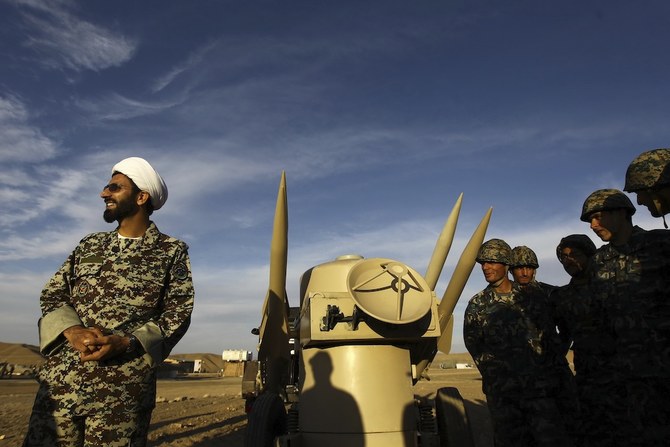
- Tehran, which could now purchase weapons from Russia, China and elsewhere, has hailed the development as a diplomatic victory
White House wants ‘real progress’ before restoring UNRWA funding

- “In terms of our funding of UNRWA, that is still suspended,” Kirby said
- “We welcome the results of this report and strongly support the recommendations in the report“
WAHSINGTON: The White House said Tuesday it would “have to see real progress” before restoring its funding to the UN agency for Palestinians, the main aid agency operating in war-torn Gaza.
The comments from National Security Council spokesman John Kirby came after the US froze aid to the United Nations Relief and Works Agency following accusations by Israel that its staff may have participated in the October 7, 2023, Hamas attacks.
A UN probe is looking into those accusations.
A separate independent review into UNRWA found some “neutrality-related issues” in its much-anticipated report released Monday. It noted Israel had yet to provide evidence for incendiary allegations that staff were members of terrorist organizations.
“In terms of our funding of UNRWA, that is still suspended. We’re gonna have to see real progress here before that gets changed,” Kirby said.
Many donor countries have resumed funding since Israel’s accusations, including Sweden, Canada, Japan, the EU and France — while others, including the United States and Britain — have continued to hold out.
“We welcome the results of this report and strongly support the recommendations in the report,” Kirby said, noting that the United States also faced legal constraints in restarting its funding.
Congress passed a bill signed into law by President Joe Biden last month that blocks US funding until March 2025.
UNRWA, which employs some 30,000 people, began operations in 1950 and provides services to nearly six million people across Jordan, Lebanon, Syria, the Gaza Strip and the West Bank, including East Jerusalem.
The neutrality issues highlighted in Monday’s report included staff sharing biased political posts on social media and the use of a small number of textbooks with “problematic content” in some UNRWA schools.
US sanctions four over ‘malicious cyber activity’ for Iran’s military
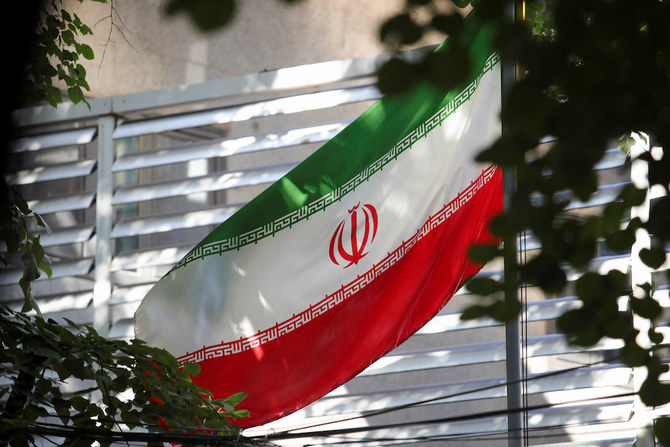
- The individuals and companies were working “on behalf of” Iran’s Islamic Revolutionary Guard Corps Cyber Electronic Command (IRGC-CEC), the Treasury said
- Tuesday’s sanctions are the latest to be levied against Tehran by the United States
WASHINGTON: The US ramped up its sanctions against Iran on Tuesday, designating four people and two companies it says were “involved in malicious cyber activity” on behalf of the country’s military.
“These actors targeted more than a dozen US companies and government entities through cyber operations, including spear phishing and malware attacks,” the US Treasury Department said in a statement.
The individuals and companies were working “on behalf of” Iran’s Islamic Revolutionary Guard Corps Cyber Electronic Command (IRGC-CEC), the Treasury said.
“Iranian malicious cyber actors continue to target US companies and government entities in a coordinated, multi-pronged campaign intended to destabilize our critical infrastructure and cause harm to our citizens,” the Treasury’s undersecretary for terrorism and financial intelligence Brian Nelson said in a statement.
“The United States will continue to leverage our whole-of-government approach to expose and disrupt these networks’ operations,” he added.
Tuesday’s sanctions are the latest to be levied against Tehran by the United States and its allies for supporting anti-Israel proxies in the Middle East and for providing military support for Russia’s war in Ukraine.
Last week, the US and Britain announced widespread sanctions against Iran’s military drone program in response to Tehran’s large-scale attack against Israel earlier this month.
That attack came in response to an April 1 air strike on the Iranian consulate in Damascus — widely blamed on Israel — that killed seven members of the Islamic Revolutionary Guard Corps, including two generals.
A day after those sanctions were unveiled, the US fined a Thailand-based firm $20 million for more than 450 possible Iran sanctions violations.
They included processing close to $300 million in wire transfers for a company jointly owned by the National Petroleum Company of Iran.
Alongside the Tuesday’s sanctions, the US Department of Justice and the Federal Bureau of Investigation (FBI) have also indicted the four individuals in question, “for their roles in cyber activity targeting US entities,” the Treasury Department said.
Egypt condemns Israeli human rights violations in Gaza Strip
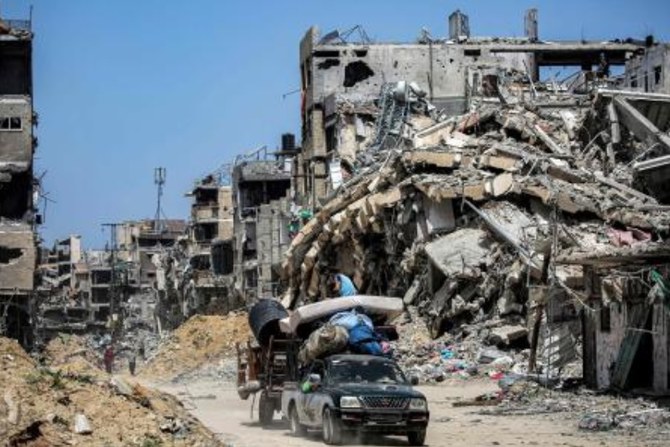
- Egypt said it condemned violations of international law including the targeting of civilians
- Abu Zeid reiterated the need for immediate intervention by the international community to stop such violations
CAIRO: Egypt has condemned the repeated Israeli violations of international law and international humanitarian law in the Gaza Strip.
The Egyptian Ministry of Foreign Affairs said: “It is regrettable and shameful that violations of international law and humanitarian values continue in such a flagrant manner in the 21st century, in full view and hearing of all countries, international organizations, and the Security Council.”
This came during statements made by ministry spokesman Ahmed Abu Zeid regarding the discovery of mass graves in the Nasser Medical Complex in Khan Yunis in the southern Gaza Strip.
Egypt said it condemned violations of international law including the targeting of civilians, displaced persons, and medical teams by Israeli forces.
Abu Zeid reiterated the need for immediate intervention by the international community to stop such violations and to conduct the necessary investigations to hold perpetrators accountable.
He added that the killing, destruction, and violence witnessed in the West Bank over the past few weeks is no less dangerous, further aggravates the crisis, and threatens to escalate tensions across all occupied Palestinian territories.
He called for an immediate halt to the violence and attacks by settlers, protected by Israeli forces, against Palestinian civilians, their property, and homes in the West Bank.
The bodies of over 200 Palestinians, including patients, have been uncovered so far in mass graves at the Nasser Medical Complex in Gaza’s Khan Younis since Saturday, according to media reports.
Hezbollah drones target northern Acre in response to Israeli strikes on Lebanese group
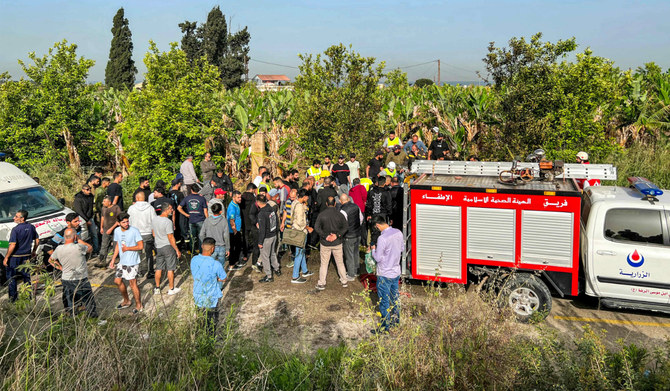
- Israeli media reported that “those present on the beach were evacuated after a Hezbollah drone was intercepted in the skies over Nahariyya and Acre”
- Israeli army had said it killed “two significant terrorists in Hezbollah’s aerial unit”
BEIRUT: Hezbollah forces in south Lebanon on Tuesday launched a combined aerial attack with diversionary and assault drones on Israeli military targets.
The focus of the Lebanese group’s attack was the headquarters of the Golani Brigade at the Shraga barracks, north of the city of Acre.
The attack was described as “a new qualitative strike against an Israeli site,” using drones said to be able to bypass Israeli radar and avoid Iron Dome missiles.
A security source told Arab News that the attack was “a sensitive targeting.” The area struck is more than 15 km from the border with Lebanon.
“This targeting took place in broad daylight while the Israelis were celebrating the Jewish Passover,” the source said.
Hezbollah said it launched the drones “in response to Israeli aggression against the Lebanese town of Aadloun and the assassination of a (Hezbollah) cadre there.”
Videos on social media showed explosions and smoke rising north of the coastal city of Acre, with beachgoers fleeing in all directions.
Israeli media reported that “those present on the beach were evacuated after a Hezbollah drone was intercepted in the skies over Nahariyya and Acre.”
A few hours after Hezbollah’s strike, Israeli warplanes carried out an airstrike on the town of Hanin, 7 km north of Bint Jbeil. It destroyed a two-story family house.
Initial reports said there were two casualties, including a woman, and five were wounded, some seriously, including women and children. The injured were transferred to hospitals.
Meanwhile, an Israeli military drone struck a car between the towns of Adloun and Al-Kharayeb, killing Hussein Ali Azqul, who reports suggested was an engineer working in Hezbollah’s air defense unit.
The group was left mourning a second member, Mohammed Khalil Attiya, from Qana, who died from injuries received a few days ago. The Israeli army described him as a “leader in the Radwan Force (a Hezbollah special unit).”
In ongoing cross-border clashes between Hezbollah and Israeli forces, the former said it had attacked “a gathering of Israeli enemy soldiers in the vicinity of Al-Asi,” to which Israeli fighter jets retaliated with airstrikes on the towns of Blida and Hula.
Israeli airstrikes continued relentlessly on Tuesday night, striking Yaroun and Al-Aishiya as well as other districts in south Lebanon.
The Israeli military also launched flash bombs over villages in the western and central areas, extending to the outskirts of Tyre, and on Tuesday morning fired heavy weapon rounds toward the towns of Naqoura and Jabal Al-Labouneh.
Houthi threats continue but attacks on ships in Red Sea appear to be on hold
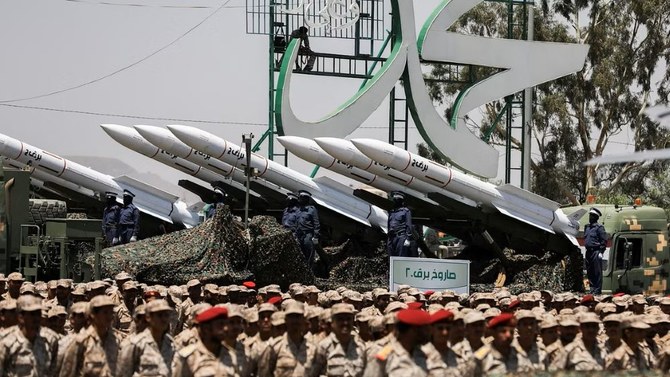
- Observers speculate the militia might be running out of drones and missiles, or air strikes by US and UK could have damaged launchers
- Houthis have claimed credit for significantly fewer assaults this month and international marine agencies have reported a decline in the number of strikes
AL-MUKALLA: Despite ongoing threats by Houthi leaders in Yemen that they will continue to attack international shipping in the Red Sea, the number of strikes on vessels has drastically fallen in recent weeks.
The group has not claimed credit for any assaults on ships since April 10. Analysts speculate that the militia might be running out of missiles and drones, or air strikes on Houthi targets by the US and UK could have damaged their launchers.
Since November, the Houthis have launched hundreds of drones, ballistic missiles and remotely controlled and explosive-laden boats at international commercial and naval ships in the Red Sea, Bab Al-Mandab Strait and the Gulf of Aden. They say they are acting in support of the Palestinian people and the aim is to force Israel to allow more humanitarian aid to enter the Gaza Strip.
Compared with the early days of their campaign, the Houthis have claimed credit for significantly fewer assaults this month, and international marine agencies have reported a decline in the number of strikes.
The organization UK Maritime Trade Operations, which records attacks on shipping, has not received any notifications of incidents in the Red Sea or Gulf of Aden since April 7, one of the longest periods with no reported attacks since the start of the Houthi campaign almost six months ago.
The US Central Command last reported intercepting Houthi missiles and drones on April 16. Prior to that it had been issuing almost daily notifications.
Despite the decline in attacks on shipping, the Houthis’ Political Office said on Monday it had instructed its military forces to escalate attacks in the Red Sea and Arabian Sea on ships linked to or bound for Israel in response to what it described as “genocide crimes” committed by Israel against Palestinians in Gaza.
Mohammed Al-Basha, an expert on the Middle East with the Navanti research group in the US, cautioned that the recent extended period without any claims of attacks does not necessarily mean the Houthis have halted their attacks in the Red Sea.
“The absence of frequent daily claims could also represent a strategic decision or the possibility of diplomatic or secret talks, rather than an operational inability,” he wrote in a message posted on social media platform X.
“This might suggest that the missile stockpile of the Houthis is diminishing, while the production of drones remains steady.”
Yemeni military analyst Brig. Gen. Mohammed Al-Kumaim suggested airstrikes in recent months by US and UK forces might have diminished the capability of the Houthis to launch attacks, and said the group might be settling into a war of attrition.
“The US may have targeted the few mobile missile launchers belonging to the Houthi militia; they need three or four launchers if they have 100 missiles,” he told Arab News.
The UN’s special envoy for Yemen, Hans Grundberg, said on Monday he held talks with Houthi negotiator Mohammed Abdul Sallam and Omani officials in Muscat to explore ways in which to advance a UN-brokered peace plan for Yemen while also reducing wider tensions in the Middle East.
Abdul Aziz Al-Bukair, a Houthi government minister of state, said the militia’s representatives discussed with Grundberg their recent negotiations with Saudi authorities, as well as issues such as payment of wages to public-sector workers, the reopening of key roads in Yemen, and oil exports.
The ongoing, UN-led peace efforts to end the near decade-long war in Yemen suffered a severe blow when the Houthis began attacking ships in the Red Sea in November.




